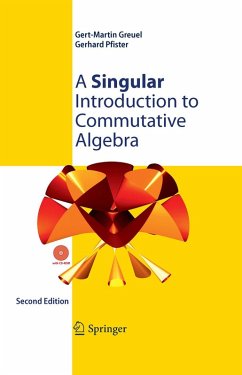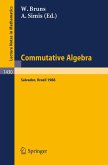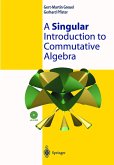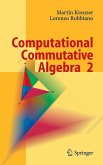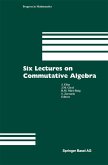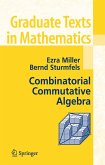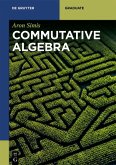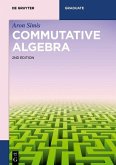From the reviews: "...It is certainly no exaggeration to say that Greuel and Pfister's A Singular Introduction to Commutative Algebra aims to lead a further stage in the computational revolution in commutative algebra, in which computational methods and results become central to how the subject is taught and learned. [...] Among the great strengths and most distinctive features of Greuel and Pfister's book is a new, completely unified treatment of the global and local theories. The realization that the two cases could be combined to this extent was decisive in the design of the Singular system, making it one of the most flexible and most efficient systems of its type. The authors present the first systematic development of this unified approach in a textbook here, and this aspect alone is almost worth the price of admission. Another distinctive feature of this book is the degree of integration of explicit computational examples into the flow of the text. Strictly mathematical components of the development (often quite terse and written in a formal "theorem-proof" style) are interspersed with parallel discussions of features of Singular and numerous Singular examples giving input commands, some extended programs in the Singular language, and output. [...] Yet another strength of Greuel and Pfister's book is its breadth of coverage of theoretical topics in the portions of commutative algebra closest to algebraic geometry, with algorithmic treatments of almost every topic. A synopsis of the table of contents will make this clear. [...] Greuel and Pfister have written a distinctive an highly useful book that should be in the library of every commutative algebrais and algebraic geometer, expert and novice alike. I hope that it achieves the educational impact it deserves." John B. Little, Monthly of The Mathematical Association of America, March 2004 "... The authors' most important new focus is the presentation of non-well orderings that allow them the computational approach for local commutative algebra. In fact the book provides an introduction to commutative algebra from a computational point of view. So it might be helpful for students and other interested readers (familiar with computers) to explore the beauties and difficulties of commutative algebra by computational experiences. In this respect the book is the one of the first samples of a new kind of textbooks in algebra." P.Schenzel, Zentralblatt für Mathematik 1023.13001, 2003
Dieser Download kann aus rechtlichen Gründen nur mit Rechnungsadresse in A, B, BG, CY, CZ, D, DK, EW, E, FIN, F, GR, HR, H, IRL, I, LT, L, LR, M, NL, PL, P, R, S, SLO, SK ausgeliefert werden.
From the reviews of the second edition:
"...It is certainly no exaggeration to say that Greuel and Pfister's A Singular Introduction to Commutative Algebra aims to lead a further stage in the computational revolution in commutative algebra, in which computational methods and results become central to how the subject is taught and learned. [...] Among the great strengths and most distinctive features of Greuel and Pfister's book is a new, completely unified treatment of the global and local theories. The realization that the two cases could be combined to this extent was decisive in the design of the Singular system, making it one of the most flexible and most efficient systems of its type. The authors present the first systematic development of this unified approach in a textbook here, and this aspect alone is almost worth the price of admission. Another distinctive feature of this book is the degree of integration of explicit computational examples into the flow of the text. Strictly mathematical components of the development (often quite terse and written in a formal "theorem-proof" style) are interspersed with parallel discussions of features of Singular and numerous Singular examples giving input commands, some extended programs in the Singular language, and output. [...] Yet another strength of Greuel and Pfister's book is its breadth of coverage of theoretical topics in the portions of commutative algebra closest to algebraic geometry, with algorithmic treatments of almost every topic. A synopsis of the table of contents will make this clear. [...] Greuel and Pfister have written a distinctive an highly useful book that should be in the library of every commutative algebrais and algebraic geometer, expert and novice alike. I hope that it achieves the educational impact it deserves." -- John B. Little, Monthly of The Mathematical Association of America, March 2004
"... The authors' most important new focus is the presentation of non-well orderings that allow them the computational approach for local commutative algebra. ...
In fact the book provides an introduction to commutative algebra from a computational point of view. So it might be helpful for students and other interested readers (familiar with computers) to explore the beauties and difficulties of commutative algebra by computational experiences. In this respect the book is the one of the first samples of a new kind of textbooks in algebra." -- P.Schenzel, Zentralblatt für Mathematik 1023.13001, 2003
"It is certainly no exaggeration to say that ... A Singular Introduction to Commutative Algebra aims to lead a further stage in the computational revolution in commutative algebra ... . Among the great strengths and most distinctive features ... is a new, completely unified treatment of the global and local theories. ... Greuel and Pfister have written a distinctive and highly useful book that should be in the library of every commutative algebraist and algebraic geometer, expert and novice alike." -- John B. Little, MAA, March 2004
"The aim of the book is ... an introduction to commutative algebra with a view towards to algorithmic aspects and computational practice. ... The authors' most important new focus is the presentation of non-well orderings that allow them the computational approach for local commutative algebra. ... It might be helpful for students and other interested readers ... to explore the beauties and difficulties of commutative algebra ... . The book is one of the first samples of a new kind of textbooks in algebra." -- Peter Schenzel, Zentralblatt MATH, Vol. 1023, 2003
"The book under review is the second, extended edition of the first ... published in 2002. ... It is highly recommended for all - students and researchers - who are interested in practical computations of their algebraic interests as well as for introductory research projects for students." -- Peter Schenzel, Zentralblatt MATH, Vol. 1133 (11), 2008
"Greuel and Pfister were two of the original developers of SINGULAR, a free, open-source, award-wining system for computing with rings and ideals; hence the title of this book. ... The writing is clear and precise. Most of the examples are excellent and insightful ... . A substantial number of exercises accompany each section ... . serve well as a graduate-level textbook in commutative algebra or as a resource for independent study." -- John Perry, The Mathematical Association of America, June, 2008
"...It is certainly no exaggeration to say that Greuel and Pfister's A Singular Introduction to Commutative Algebra aims to lead a further stage in the computational revolution in commutative algebra, in which computational methods and results become central to how the subject is taught and learned. [...] Among the great strengths and most distinctive features of Greuel and Pfister's book is a new, completely unified treatment of the global and local theories. The realization that the two cases could be combined to this extent was decisive in the design of the Singular system, making it one of the most flexible and most efficient systems of its type. The authors present the first systematic development of this unified approach in a textbook here, and this aspect alone is almost worth the price of admission. Another distinctive feature of this book is the degree of integration of explicit computational examples into the flow of the text. Strictly mathematical components of the development (often quite terse and written in a formal "theorem-proof" style) are interspersed with parallel discussions of features of Singular and numerous Singular examples giving input commands, some extended programs in the Singular language, and output. [...] Yet another strength of Greuel and Pfister's book is its breadth of coverage of theoretical topics in the portions of commutative algebra closest to algebraic geometry, with algorithmic treatments of almost every topic. A synopsis of the table of contents will make this clear. [...] Greuel and Pfister have written a distinctive an highly useful book that should be in the library of every commutative algebrais and algebraic geometer, expert and novice alike. I hope that it achieves the educational impact it deserves." -- John B. Little, Monthly of The Mathematical Association of America, March 2004
"... The authors' most important new focus is the presentation of non-well orderings that allow them the computational approach for local commutative algebra. ...
In fact the book provides an introduction to commutative algebra from a computational point of view. So it might be helpful for students and other interested readers (familiar with computers) to explore the beauties and difficulties of commutative algebra by computational experiences. In this respect the book is the one of the first samples of a new kind of textbooks in algebra." -- P.Schenzel, Zentralblatt für Mathematik 1023.13001, 2003
"It is certainly no exaggeration to say that ... A Singular Introduction to Commutative Algebra aims to lead a further stage in the computational revolution in commutative algebra ... . Among the great strengths and most distinctive features ... is a new, completely unified treatment of the global and local theories. ... Greuel and Pfister have written a distinctive and highly useful book that should be in the library of every commutative algebraist and algebraic geometer, expert and novice alike." -- John B. Little, MAA, March 2004
"The aim of the book is ... an introduction to commutative algebra with a view towards to algorithmic aspects and computational practice. ... The authors' most important new focus is the presentation of non-well orderings that allow them the computational approach for local commutative algebra. ... It might be helpful for students and other interested readers ... to explore the beauties and difficulties of commutative algebra ... . The book is one of the first samples of a new kind of textbooks in algebra." -- Peter Schenzel, Zentralblatt MATH, Vol. 1023, 2003
"The book under review is the second, extended edition of the first ... published in 2002. ... It is highly recommended for all - students and researchers - who are interested in practical computations of their algebraic interests as well as for introductory research projects for students." -- Peter Schenzel, Zentralblatt MATH, Vol. 1133 (11), 2008
"Greuel and Pfister were two of the original developers of SINGULAR, a free, open-source, award-wining system for computing with rings and ideals; hence the title of this book. ... The writing is clear and precise. Most of the examples are excellent and insightful ... . A substantial number of exercises accompany each section ... . serve well as a graduate-level textbook in commutative algebra or as a resource for independent study." -- John Perry, The Mathematical Association of America, June, 2008

